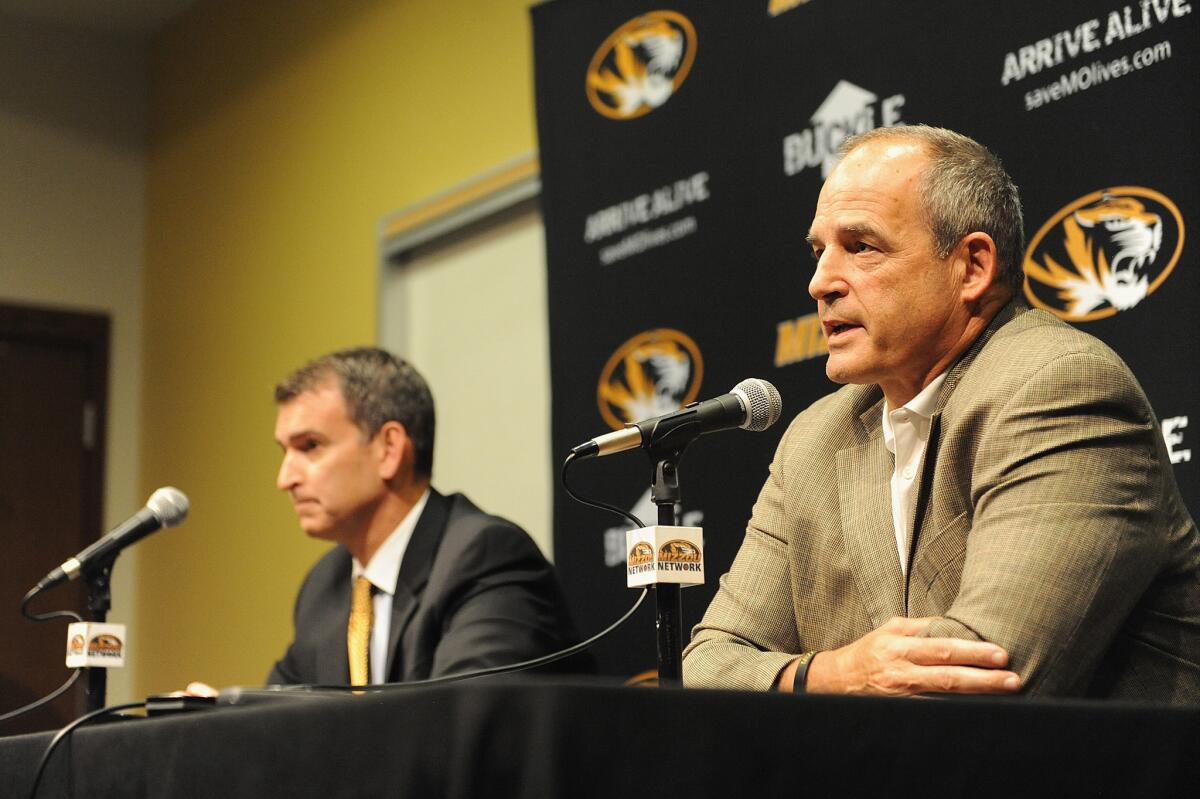Missouri football players show the power of unity through boycott

The support of Missouri Coach Gary Pinkel, right, helped bolster his players’ attempts to enact change. It was a stark contrast to a similar situation at Wyoming in 1969.
- Share via
Until the late-night tweet over the weekend announcing a boycott by dozens of University of Missouri football players, efforts to oust President Tim Wolfe because of racial tension at the campus in Columbia, Mo., received scant attention.
The unusual pledge by the football players to skip all team activities in the middle of the season transformed the protest into a national story. Less than 48 hours later, Wolfe resigned.
The situation provided the most public example yet of the growing boldness by college athletes to leverage their positions to affect change on campus and beyond.
“I look at this as certainly a watershed moment,” said B. David Ridpath, a former college administrator who is professor of sports administration at Ohio University. “I think this is an incident that will make athletes realize that ... ultimately they have the power.”
The surge of attention demonstrated the power wielded by the young men on football scholarships at Missouri, where the sport accounts for nearly half of the athletic department’s $83 million in annual revenue, and at other homes of big-time college football.
“I think this will be a turning point where players really witnessed the type of power they can display,” said Ramogi Huma, a former UCLA football player who is president of the reform-minded National Collegiate Players Assn. “Every time a player stands up, I think it gives the next player more confidence to do so.”
There are plenty of examples of activism in sports, although typically it has taken more subtle forms. After the recording of Donald Sterling denigrating African Americans became public in April 2014, Clippers players piled their warm-up jackets on the court and turned their shirts inside out to hide the team’s logo before a game. In December, Cleveland Cavaliers star LeBron James and other NBA players wore “I can’t breathe” T-shirts to draw attention to the death of Eric Garner earlier in the year. The same month, several NFL players raised their arms during pregame introductions in a gesture meant to honor Michael Brown.
Protests in college sports in recent years have come against the backdrop of lawsuits, health concerns and contentious attempts to reform the NCAA.
Get the latest in sports with our free newsletter >>
Upset over deteriorating facilities and long bus rides to games, Grambling State football players registered a weeklong protest in October 2013 that included not attending practice and forfeiting a game against Jackson State.
A series of tweets in May by former Illinois football player Simon Cvijanovic alleging that coach Tim Beckman pressured players to play while injured led to the coach’s firing in August. The school released Monday a 1,267-page investigation in the matter and fired Athletic Director Mike Thomas.
More than two dozen football players wrote “APU” — shorthand for All Players United — on their gear in September 2013 to protest the NCAA’s treatment of athletes. Football players at Northwestern tried to form a union in 2014 to collectively bargain with the school, but three months ago the National Labor Relations Board denied the effort. Huma helped to organize both efforts, but he wasn’t involved in the Missouri boycott.
“The power players would have if they would unite would lead to NCAA reforms,” Huma said.
What occurred at Missouri is different than many of the previous protests around college sports in recent years, both in scope and the potential reverberations in schools around the country.
Missouri’s athletic department quickly and publicly supported the boycott, even though it briefly jeopardized Saturday’s game with Brigham Young. Coach Gary Pinkel tweeted a photo showing scores of players and coaches with somber faces and linked arms. The team’s four-game losing streak and 4-5 record seemed far away.
“The Mizzou Family stands as one,” said the tweet, which received nearly 30,000 retweets and likes. “We are united. We are behind our players.”
Although the game will go ahead as scheduled, Ridpath believes the effect could extend far beyond the Missouri campus. The idea of a major-college sports team mounting an effective boycott is no longer an abstract one. It happened and it worked.
“I think there’s some nervousness and trepidation in the hallways [at NCAA headquarters] in Indianapolis and throughout America,” Ridpath said. “If the athletes sit down, then the games aren’t going to happen. There’s nothing that any multimillion-dollar coach, college sports athletics director or booster can do.”
MORE ON THE UNIVERSITY OF MISSOURI
Video captures Missouri protesters’ clash with media
Protesters celebrate after top University of Missouri leaders resign over racial turmoil
University of Missouri football team and coach join protest to oust university leader
More to Read
Go beyond the scoreboard
Get the latest on L.A.'s teams in the daily Sports Report newsletter.
You may occasionally receive promotional content from the Los Angeles Times.











